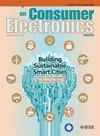基于图卷积网络和MULTIMOORA的临床决策支持系统的稳定智能模型框架
IF 4.3
2区 计算机科学
Q1 ENGINEERING, ELECTRICAL & ELECTRONIC
引用次数: 0
摘要
人工智能(AI)在消费电子领域发展迅速,特别是在临床决策支持系统(cdss)领域。人工智能驱动的设备通过预测性健康分析、重塑医疗数据收集、分析和决策,提高了医疗保健相关电子产品的有效性。然而,由于来自消费电子产品的医疗数据中大量不精确、犹豫和模糊的信息,人工智能可能会误解这些数据,从而导致错误和不稳定的医疗决策。因此,本文试图利用图卷积网络(GCNs)和MULTIMOORA (Multi-Objective Optimization by Ratio Analysis and the full multiplication form)这两个基本工具,建立一个稳定的智能医疗决策模型。首先,建立了基于GCNs和MULTIMOORA的颗粒计算(GrC)框架。在该框架中,GCNs最初用于处理犹豫模糊语言(HFL)背景下的多模态数据。其次,构建了一个全面的HFL信息系统。第三,通过MULTIMOORA开发了三种多粒度(MG) HFL方法。为了更好地解决决策者的有限理性问题,利用后悔理论(RT)对多模态数据进行整合。最后,以药物选择为例,对所提出的决策模型的有效性和实用性进行了评价。本文章由计算机程序翻译,如有差异,请以英文原文为准。
A Stable Intelligent Model-Based Framework Using Graph Convolutional Networks and MULTIMOORA for Clinical Decision Support Systems
Artificial intelligence (AI) is rapidly advancing in consumer electronics, particularly in clinical decision support systems (CDSSs). AI-driven devices enhance the effectiveness of healthcare-related electronics via predictive health analytics, reshaping medical data collection, analysis, and decision-making. Nevertheless, due to the abundance of imprecise, hesitant, and fuzzy information in healthcare data stemming from consumer electronics, AI may misinterpret the data, resulting in erroneous and unstable medical decisions. Therefore, this paper endeavors to establish a stable intelligent medical decision model, employing two essential tools: graph convolutional networks (GCNs) and MULTIMOORA (Multi-Objective Optimization by Ratio Analysis plus the full MULTIplicative form). First, a granular computing (GrC) framework based on GCNs and MULTIMOORA is established. In this framework, GCNs are initially employed to process multi-modal data within the hesitant fuzzy linguistic (HFL) background. Second, a comprehensive HFL information system (IS) is constructed. Third, three types of multi-granularity (MG) HFL methods are developed via MULTIMOORA. To better address the bounded rationality of decision-makers (DMs), regret theory (RT) is utilized to consolidate the multi-modal data. Finally, the efficacy and practically of the proposed decision model are assessed via a case study on medication selections.
求助全文
通过发布文献求助,成功后即可免费获取论文全文。
去求助
来源期刊
CiteScore
7.70
自引率
9.30%
发文量
59
审稿时长
3.3 months
期刊介绍:
The main focus for the IEEE Transactions on Consumer Electronics is the engineering and research aspects of the theory, design, construction, manufacture or end use of mass market electronics, systems, software and services for consumers.

 求助内容:
求助内容: 应助结果提醒方式:
应助结果提醒方式:


